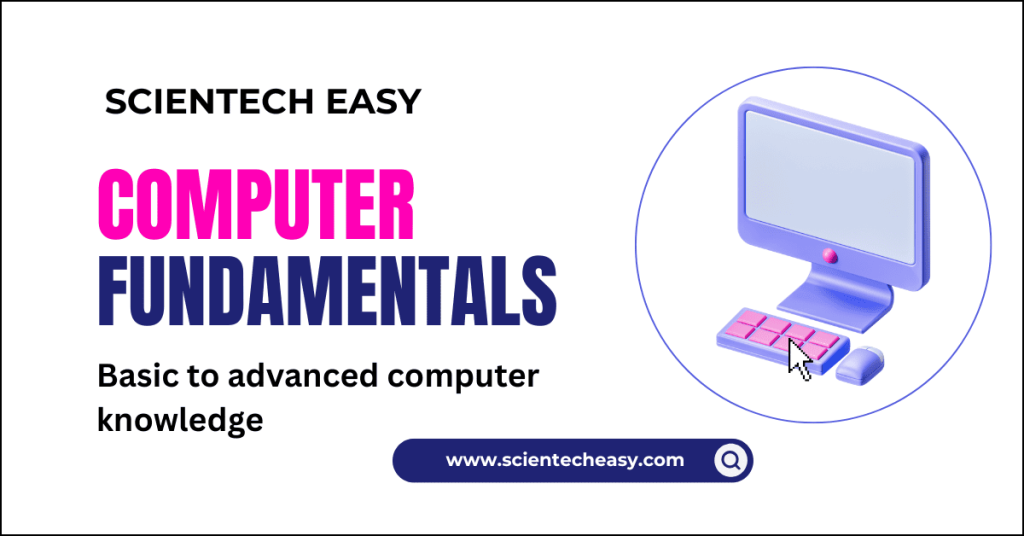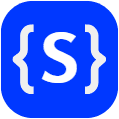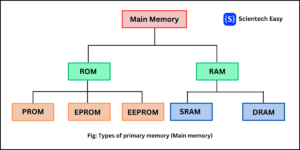Computer Fundamentals: Basic Computer Knowledge
Computer Fundamentals are the basic knowledge and understanding of how a computer works, including its structure, components, functions, and applications. They cover everything from basic to advanced concepts such as computer hardware, software, memory, data processing, operating systems, and peripherals.
The basic knowledge of computer fundamentals is essential for operating computers and using their applications effectively. Whether you are a beginner, student, or professional, and want to study computer fundamentals, you have come at right place.
Having strong computer knowledge is very important for students who are preparing for competitive exams, job seekers in the IT field, and anyone who wants to improve digital literacy. By mastering these basic concepts, one can easily move forward to advanced concepts like programming, networking, and cybersecurity.

Importance of Computer Fundamentals
Understanding computer fundamentals is important for several reasons:
- Helps you understand how computers work and solve problems effectively.
- Makes learning new technologies easier and improves career opportunities.
- Helps in preparing for competitive exams like SSC, banking, railways, and IT certifications.
- Enables you to use computers and software safely and efficiently.
- Develop confidence to adapt to rapid changes in technology.
- Provides a strong foundation for programming and IT careers.
- Improves digital literacy, making everyday tasks easier.
Applications of Computers in Daily Life
Today, computers are used in almost every field:
- Education – Online learning, digital classrooms, research.
- Healthcare – Medical diagnosis, patient records, surgeries.
- Business – Accounting, data analysis, online transactions.
- Communication – Emails, video calls, social media.
- Entertainment – Gaming, movies, music streaming.
Advantages of Learning Computer Fundamentals
Basic computer knowledge is essential in almost every field today. There are several advantages of learning computer fundamentals whether you are beginners or students. They are:
- Enhances problem-solving and analytical skills.
- Increases job opportunities in IT and non-IT sectors.
- Improves efficiency and productivity in personal and professional work, like how to use software, automate tasks, and troubleshoot issues.
- Provides better understanding of digital security and online safety.
FAQs on Computer Fundamentals
A computer is a programmable electronic device that receives data as input, processes it according to a set of instructions, and produces meaningful result or information.
C – Computer
O – Operate
M – Memory
P – Print
U – Update
T – Tabulate
E – Edit
R – Response
Data is a raw material. It is a collection of unorganized facts or figures that are collected and stored. For example, numbers, names, dates, or measurements.
Information is processed data that is organized and presented in a meaningful way to the user.
The main characteristics of computer are:
Automation
Speed
Accuracy,
Efficiency
Versatility
Diligence
Memory power (Storage)
No I.Q.
No feelings
The development of computers can be classified into the following generations:
First generation computer: 1940 – 1956
Second generation computer: 1956 – 1963
Third generation computer: 1964 – 1971
Fourth generation computer: 1971 – Present
Fifth generation computer: Present – Future
The key functional components of a computer system are hardware, software, data, and users.
Hardware refers to the physical electronic parts of a computer that we can see and touch. Monitor, CPU, hard disk, memory, SSD, keyboard, etc., are examples of hardware.
Software is a set of instructions that tells the computer how to perform tasks. It is non-visible parts. There are two types of software: system software and application software. Windows, Linux, macOS are examples of system software. While MS Word, web browsers, games, and business tools are examples of application software.
Advantages of using computers:
Speed
Accuracy
Automation
Storage
Communication
Productivity
Final Thoughts
Computer fundamentals are the backbone of modern technology. By learning the basics of computers—hardware, software, core functions, and applications—you can build a strong foundation for future learning in programming, computer networking, and advanced IT skills. Whether you are a beginner, a student, or a professional, mastering these basics will help you stay ahead in the digital world.




